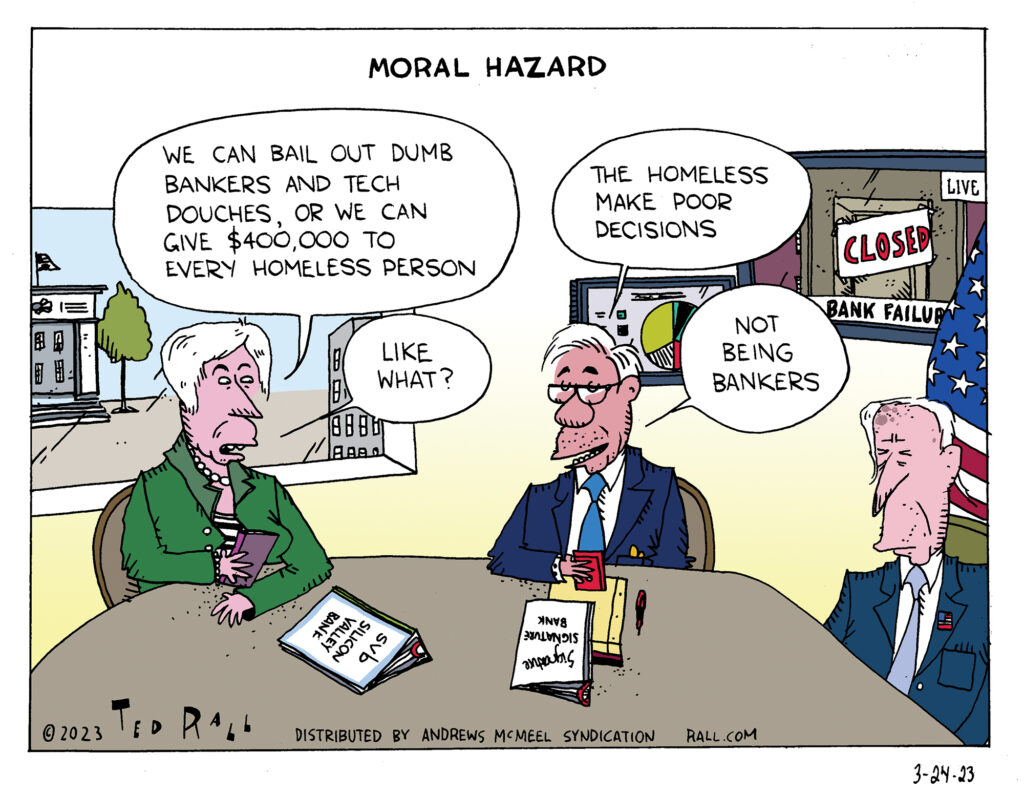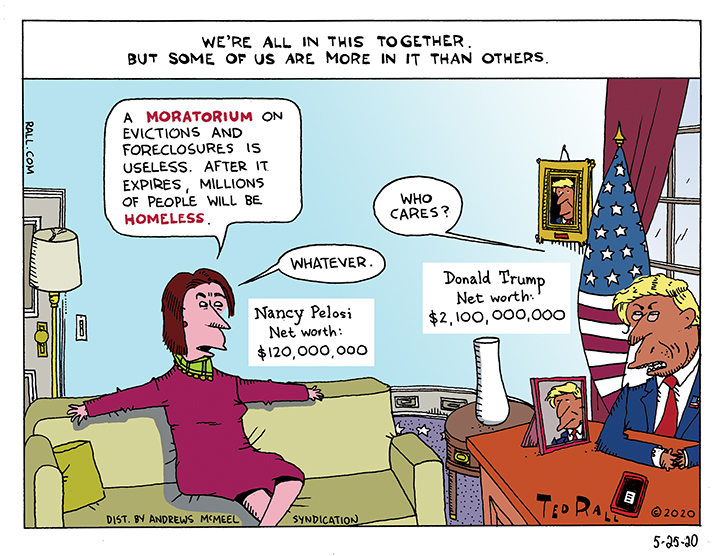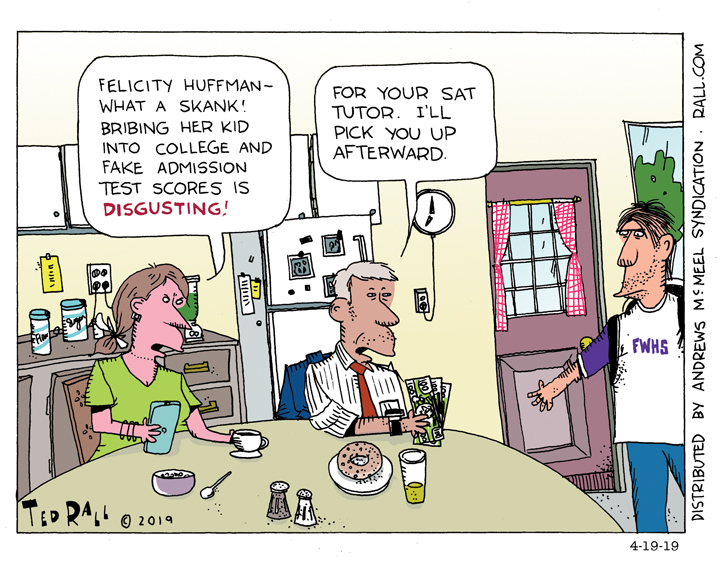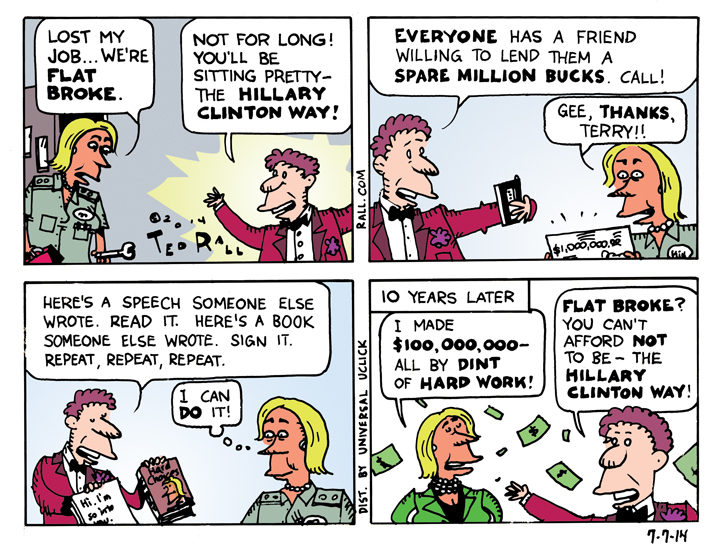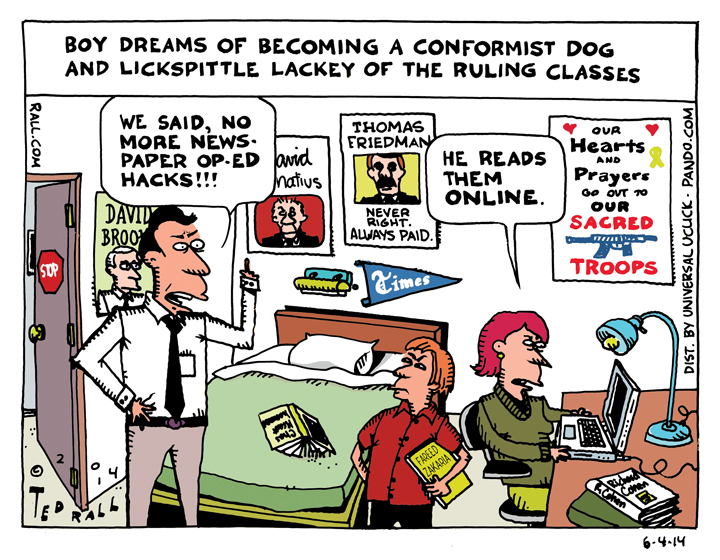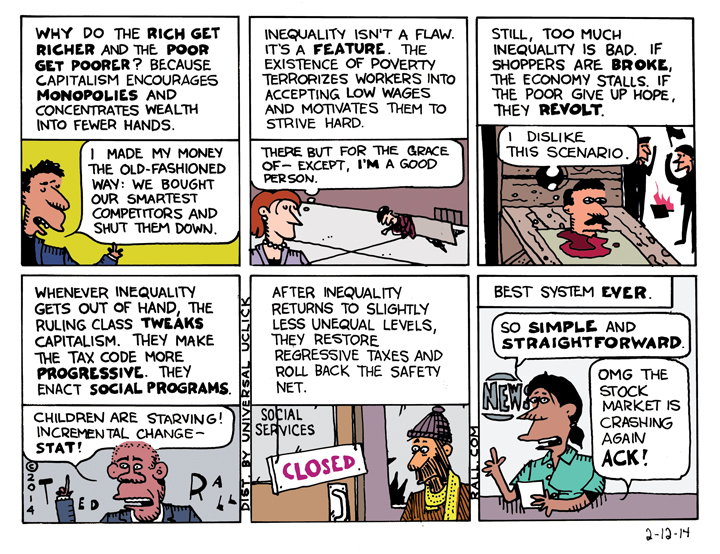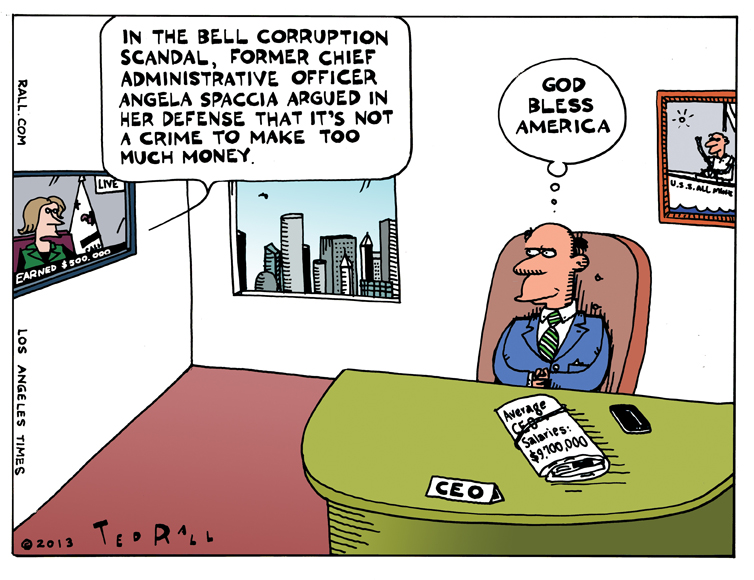Covering $300 billion of Non-FDIC-insured deposits at the failed Signature Bank and Silicon Valley Bank was an easy decision for the leaders of a capitalist system that prioritizes profits over people.
SYNDICATED COLUMN: Who’s Really To Blame for Brexit (and Trump)
 At this writing, securities markets and the international community are reeling at the news that British voters have opted to leave the European Union. The “Brexit” has provoked angry reactions from the pro-Remain camp, who accuse Leave voters of stupidity, shortsighted ignorance and, worse, thinly-disguised racism and nativism posing as nationalism.
At this writing, securities markets and the international community are reeling at the news that British voters have opted to leave the European Union. The “Brexit” has provoked angry reactions from the pro-Remain camp, who accuse Leave voters of stupidity, shortsighted ignorance and, worse, thinly-disguised racism and nativism posing as nationalism.
Political analysts point out that British voters were divided geographically – Scotland wanted to stay, England wanted to leave – as well as demographically. One chart that managed to go semi-viral online displayed high support for the Brexit among older voters, opposition among the young, alongside the actuarial average years remaining that each age group would have to live with the consequences of the vote. The smartest of these pundits focus on the class divide between shiny expensive youth-oriented cities like London, where pro-European sentiments are strong, and England’s version of the Rust Belt, abandoned hellholes where citizens barely subsist in a ruined landscape of shut down factories and widespread unemployment.
“If you’ve got money, you vote in,” a voter in Manchester told The Guardian. “If you haven’t got money, you vote out,” she said.
Amid all the concern about a collapsing British pound and the possible dissolution of not only the European Union – looks like France and the Netherlands may have a similar plebiscite in the near future – but also the United Kingdom, everyone’s out to cast blame. However, no one is pointing at those who are most responsible if (and it’s far from certain) Brexit leads to an economic downturn and/or a political debacle: the West’s incompetent political class, and its idiotic enablers in the corporate media.
The postwar order began to fray during the 1970s, when business leaders and their allies in government started to push aggressively for policies that encouraged the transfer of manufacturing industries to the developing world away from what was then called the First World in preparation for what we now call the information economy. Globalization is the shorthand term for deindustrialization – some call it outsourcing, others prefer the simpler “shipping jobs overseas” – and digitalization of culture and intellectual property.
This essay isn’t about whether globalization is good or bad. It’s about the way a trend that has been consistently declared irreversible has been poorly managed. That mismanagement led to the Brexit, and may elect Donald Trump.
Even during the 1970s, globalization’s downward pressure on wages was easy to foresee. Capital was becoming increasingly fluid, crossing borders with incredible ease in search of places and people where the production of goods and services could be done as cheaply as possible. If you own a factory in Michigan, and you can figure out a way to transport your product to market at reasonable cost, doing the patriotic “made in USA” thing feels like leaving money on the table when you consider what your expenses would look like in Vietnam or Indonesia.
Workers, on the other hand, are confined by international borders, linguistic and cultural limitations, family ties, and just plain inertia, to the nations — and often the regions within those countries — where they were born. If the highest wages in the world are paid in the United Arab Emirates, you can’t just hop on a plane and expect to find a job, much less a work permit. Workers are stuck; capital moves freely. This economic imbalance between labor and management is a significant contributing factor to the decline in real median wages in countries like Great Britain and the United States since the 1970s.
Now let’s say that you’re a high-ranking member of the ruling class: a Fortune 500 CEO, a head of state, a congressman, the publisher of a big-city newspaper. You don’t need a major in history or political science in order to anticipate that subjecting tens of millions of people to long-term unemployment and underemployment is a recipe for social dysfunction and the kind of class resentment that can be exploited by a demagogue or radical populist movement.
You can do one of two things with that knowledge. You can ignore victims of economic dislocation. Or you can help them.
If you ignore them, if you greedily grab up every dollar and pound and euro you can while city after city slowly collapses into alcoholism, drug abuse and rising crime, you know you’re setting yourself up for a future of political instability. It may take a long time, but the chickens will come home to roost. When things turn ugly, it could cost you a pile of cash you amassed during your orgy of greed.
That’s what happened during the 1980s, when Margaret Thatcher and Ronald Reagan dismantled the post-World War II social safety nets. Precisely at a time when the UK and the US needed more welfare, national healthcare and public education programs, they slashed them instead. Those austerity policies continued under Tony Blair, Bill Clinton, David Cameron, and – against reason and common sense – under Barack Obama after the 2008 economic meltdown.
The British and American political classes made a conscious decision over the last 40 to 50 years not to lift a finger to help those who lost their jobs to deindustrialization and globalization. Go back to college, they say. Get retrained. But most Americans can’t afford college tuition — the jobless least of all! We need(ed) a GI Bill for the dispossessed.
Even this week, many establishment types continue to criticize aging pensioners and unemployed workers over age 50, denigrating them as selfish, clueless, unwilling and unable to adapt themselves to the new – brutal – world in which we find ourselves.
No doubt: nativism and racism played a role in the Brexit vote. England is an island nation with an island mentality. Though only a few thousand Syrians entered the UK last year, with nary a passport check, images of refugees riding the roof of trains from France through the Chunnel felt like an invasion to some Britons. But bigotry shouldn’t let us ignore the economic factor. When jobs are plentiful and salaries are rising, no one minds immigration. Xenophobia grows in the soil of scarcity.
What did the elites think? Did they really believe it was possible to make so many people so desperate and so angry for so long without a risk of them lashing out?
Donald Trump is not a brilliant man. But the political classes could learn a lesson from him. He knows that an awful lot of people are angry. And he knows why.
(Ted Rall is the author of “Bernie,” a biography written with the cooperation of Democratic presidential candidate Bernie Sanders. His next book, the graphic biography “Trump,” comes out July 19th and is now available for pre-order.)
Who Is This “Together” Starbucks’ Howard Schultz Is Talking About?
Originally published by ANewDomain.net:
He’s considered a hero, and rightly so. Still, when French General Charles de Gaulle gave his most famous speech, the Appeal of 18 June 1940, not everyone was moved. “Nothing is lost for France!” the future leader of the Free French intoned into the BBC microphone to the people of France, who had just lost their country to the Nazi invasion. “The flame of the French resistance must not be extinguished and will not be extinguished!”
“Easy for him to say!” my grandfather raged. “He’s sitting over there in London, sipping tea! Here we’ve got the krauts up our ass!”
He changed his mind later. But still: terrible first communiqué.
Communications 101: If you hope others to follow you as a leader, remember who and where and what you are.
If you don’t, others will.
Starbucks CEO Howard Schultz forgot self-awareness with this week’s clumsy rollout of the coffee conglomerate’s “Race Together” advertising campaign featuring social media hashtags and handwritten cups — and stepped in something that looked and felt like a pile of day-old coffee grinds but smelled worse on Twitter.
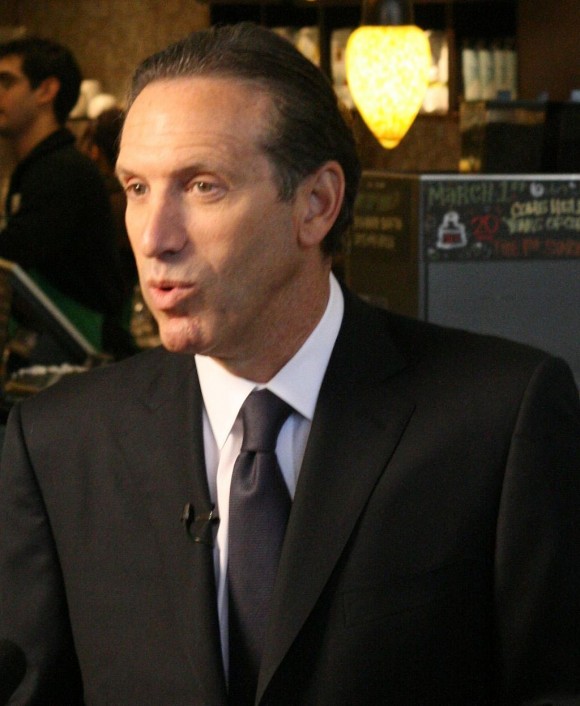 What could go wrong? Schultz wanted to spark a discussion about race in America. The slogan, though cloddish, was something few would argue with: Unity is good. But then: everyone hated it. “Honest to God, if you start to engage me in a race conversation before I’ve had my morning coffee, it will not end well,” tweeted the usually placid PBS NewsHour host Gwen Ifill.
What could go wrong? Schultz wanted to spark a discussion about race in America. The slogan, though cloddish, was something few would argue with: Unity is good. But then: everyone hated it. “Honest to God, if you start to engage me in a race conversation before I’ve had my morning coffee, it will not end well,” tweeted the usually placid PBS NewsHour host Gwen Ifill.
“The brand has been called tone-deaf and obnoxious,” reported The New York Times. “Many have pointed out that the company’s leadership is predominantly white, while many of its baristas are minorities.”
Oh, that.
Which is also a class thing: Schulz “earned” $28.9 million in 2012 alone. The average barrista gets $10 an hour.
What went wrong? Starbucks in general, and Schultz in particular, didn’t have the social standing — the political legitimacy — to declare a national conversation on race.
Starbucks is too white. Too unequal. Without a history of engaging customers on political issues, it jumped straight into one of the most fraught, complex and emotional: America’s original sin. “The last person I wanna discuss race with is a snotty condescending 18 yr old barista that corrects me when I say ‘large’ instead of ‘venti,’” one Twitterer tweeted.
And there’s that “Together” thing. Zillionaire Schultz and thousandaire me? We’re not even a little “together” — even though we both cash in on white male privilege. And he’s a lot less “together” with the African-American community — members of which he isn’t hiring enough of, and not paying enough to when he does.
Who the hell was Howard Schultz to lecture us about race?
Nobody.
Similarly, Facebook COO Sheryl Sandberg has turned herself into a national laughingstock by forgetting who she is and who’s she talking to.
It began with “Lean In,” her book/PR campaign/wannabe movement to encourage working women to break through the glass ceiling by being more assertive in demanding raises, promotions and responsibility. Now the zillionaire feminist is promoting “Choreplay,” in which sex-starved husbands are encouraged to buy sexual favors from their tired working wives by performing household duties like cleaning the dishes and doing the laundry.
Let’s set aside the facts that the “girls make passes at guys who wash and dry dishes and glasses” meme (a) is way old and (b) has been decisively debunked. From a 2013 study in the American Sociological Review: “Couples in which men participate more in housework typically done by women report having sex less frequently. Similarly, couples in which men participate more in traditionally masculine tasks—such as yard work, paying bills, and auto maintenance—report higher sexual frequency.”
Nothing destroys credibility like spouting outdated nonsense.
The point is: who the hell is Sheryl Sandberg to tell us anything?
The Washington Post’s book critic sussed out Sandberg’s no-moral-standing problem in her book: “By the time she describes the pangs of guilt as a mother working outside the home — some of her most poignant passages — it is impossible to forget that she, like many of the female friends she quotes, is a wealthy, white, married woman with a ‘vast support system.’ Surely she could have included a story or two about successful women who are more likely to have been born to nannies than to hire them. Or at least more who didn’t graduate from the Ivy League.”
If you’re tonedeaf, at least be nice. (It might give you standing.) Which Sandberg was not: immediately after collecting a cool $90 million in stock sales, her new foundation posted ads looking for interns.
In other words, slaves.
Like Starbucks’ Howard Schultz, Sandberg doesn’t see that as a billionaire who owes her spectacular wealth and privilege, including household staff, to her friendship with an even wealthier man who leads a company whose tiny workforce isn’t unionized, works “at will,” and is increasingly outsourced overseas at insanely low wages, she shouldn’t telling working-class (or middle-class) women what to do.
She ought to shut up and listen.
Then, of course, there’s Hillary Clinton’s latest scandal, Emailgate.
She’d already blown the moral standing thing as a “feminist icon” who’d be unknown to the world had she not married well, and as a millionaire — at least 25 times over — who claims to have recently gone from “broke” to “not well off.”
Then she defended her decisions not to use government email as secretary of state, and delete thousands of contemporaneous private emails as attempts to protect her privacy — something every American could identify with.
“No one wants their personal emails made public, and I think most people understand that and respect that privacy,” she said.
Indeed we do.
Unfortunately, Clinton has as much moral standing on privacy rights as Dick Cheney has as a peacemaker. She voted for the Patriot Act, which unleashed the NSA monster that reads everybody’s emails, everywhere, all the time, and even called Edward Snowden a traitor for letting us know what the NSA is up to. She’s a hypocrite. Worse than that, she’s made herself look ridiculous.
Before you open your mouth to lecture anyone, remember the cautionary tales of tonedeaf elitists like Schultz, Sandberg and Clinton. If you don’t have standing to talk, you’ve got nothing to say.
Flat Broke? Try the Hillary Clinton Way!
Hillary Clinton says she and her husband Bill were “flat broke” when they left the White House in 2001. But not everyone who is “flat broke” has a friend willing to lend them $1.2 million (Terry MacAuliffe) to buy a house. Then she claimed Americans don’t resent the $100,000,000 she and Bill earned through “the dint of hard work.” What hard work? Is Hill the new Mitt?
SYNDICATED COLUMN: Ukraine Is Not a Revolution.

Mainstream news outlets in the United States, whose politics are closely aligned with those of the U.S. government, frequently criticize mainstream media outlets in Russia, whose politics are closely aligned to those of the Russian government. Current example: recent events in Ukraine.
“Russian officials have been doing everything they can to make it clear that they don’t recognize the legitimacy of this current parliament or its right to form an interim government,” NPR’s Corey Flintoff reported February 26th. “The impression that ordinary Russians would get from [their] news coverage is really that the Ukrainian Revolution is very much a thing to be feared.”
Flintoff made fun of Russian Prime Minister Dmitry Medvedev, who called the overthrow of Ukrainian president Viktor Yanukovych “essentially the result of an armed mutiny.” Russian Interior Minister Sergey Lavrov said it was “an attempt at a coup d’état and to seize power by force.”
Yet American media insist on the R-word: revolution.
Here we go again.
In U.S. and Western media, both the Tahrir Square “people power” demonstrations that removed Hosni Mubarak and the military coup that imprisoned the democratically elected Mohammed Morsi are called Egyptian “revolutions.” So is the Benghazi-based insurgency that toppled Libya’s Col. Moammar Gaddafi. If the civil war in Syria leads to the downfall of President Bashar al-Assad — even if, like Gaddafi, he gets blown up by a U.S. drone or a NATO fighter jet — they’ll call that a revolution too.
But those weren’t/aren’t revolutions. A revolution is “a forcible overthrow of a government or social order in favor of a new system.”
A new system. Those are the key words.
Even if it occurs as the result of dramatic street violence, a change in leaders doesn’t mean there has been a revolution. If the system doesn’t change much, a revolution has not taken place.
Egypt’s Tahrir Square was dramatic, an important event. But it wasn’t a revolution. This became evident last year, when General Abdel Fattah el-Sisi arrested and jailed President Morsi. If the 2011 Tahrir uprising against Mubarak had been a revolution, Sisi — a high-ranking officer who served most of his career under Mubarak — would not have been in the military at all, much less a figure powerful enough to stage a coup.
In a real revolution, the old system — all of its most important components — are replaced. Military leaders aren’t merely shuffled around or replaced; the army’s core mission and organizational structure are radically altered. It isn’t enough to rejigger boardrooms and change CEOs; the class structure itself — which defines every other role in society — is changed. (In China, for example, landlords went from a privileged class to impoverished pariahs after 1949.) Reforms don’t make a revolution. In a revolution, everything old gets trashed. Society starts from scratch.
The bar for whether a political change qualifies as a full-fledged revolution is extremely high.
And yeah, the definition matters. It matters a lot. Because revolution — capital-R, blood-in-the-streets, head-on-a-stick Revolution is by far the biggest threat to our system of corporate capitalism and the ruling classes who have been stealing almost every cent of the fortune we the people create with our hard work. If our business overlords convince us that revolution is something short of actually changing the system — in other words, getting rid of them — then they’re safe no matter what. Even if we protest, even if we turn violent, we will never truly emancipate ourselves.
Maybe they’ll pay higher taxes. For a little while. Until they bribe their way back out of them.
Until we destroy the 1%, stripping them of their money, power and social status, we will be their slaves. And that will never happen if we forget what revolution is.
Bearing in mind what revolution means, Ukraine comes nowhere close.
Consider this quote from Nicolai Petro, a politics professor at the University of Rhode Island, on Amy Goodman’s radio show:
“Yes, [Ukraine] is pretty much a classical coup, because under the current constitution the president may be—may resign or be impeached, but only after the case is reviewed by the Constitutional Court and then voted by a three-fourth majority of the Parliament. And then, either case, either the prime minister or the speaker of the Parliament must become the president. Instead, that’s not what happened at all. There was an extraordinary session of Parliament, after—it was held after most members were told there would be no session and many had left town. And then, under the chairmanship of the radical party, Svoboda, this rump Parliament declared that the president had self-removed himself from the presidency.”
Note the trappings of “legitimacy”: Constitutional Court, Parliament, preexisting political parties, laws created under the old regime.
Under a revolution, old institutions would be abolished. Anyone who had anything to do with them would be discredited, and possibly in danger of being executed. Parties, if there were any, would be new (unless they’d been operating clandestinely), with revolutionary politics and brand-new organizational structures. You certainly wouldn’t see old establishment figures like the recently released former prime minister, Yulia Tymoshenko (a leader of the “Orange Revolution” of 2004, which also wasn’t a revolution), seriously discussed as a potential new ruler.
Many Ukrainians know what revolution is — and they want one. “We need new people who can say no to the oligarchs, not just the old faces,” a 25-year-old economist told The New York Times. “The problem is that the old forces are trying to come back to take their old chairs,” said a shipping broker who waved a sign outside parliament that read: “Revolution, Not a Court Coup!”
U.S. reporters quote the would-be revolutionaries, but they can’t understand their meaning. After all, their country’s founding “revolution,” the American Revolution, was nothing of the sort. The elites became even more powerful. Slavery continued. Women still couldn’t vote. The poor and middle class didn’t gain power.
Just another coup.
(Support independent journalism and political commentary. Subscribe to Ted Rall at Beacon.)
COPYRIGHT 2014 TED RALL, DISTRIBUTED BY CREATORS.COM
How Capitalism Deals with Inequality
President Obama and the Democrats have finally decided, five years after his election, to begin talking about the issue of income inequality, which has been increasing since the early 1970s. But their rhetoric makes it sound like inequality is a weird byproduct of capitalism when, in fact, it is a key feature of an economic system that relies on poverty and exploitation. This is the best system ever conceived?
LOS ANGELES TIMES CARTOON: In America, You Can’t Be Too Rich or Too Corrupt
I draw cartoons for The Los Angeles Times about issues related to California and the Southland (metro Los Angeles).
This week:
The City of Bell is a small blue-collar community in southern L.A. County whose top officials were discovered to be earning the highest municipal salaries in the United States. Six of them, including the former mayor, face multiple counts of misappropriation of public funds, conflict of interest and other corruption charges.
This week, former Assistant Chief Administrator Angela Spaccia was on trial. For a small-time administrator of a hardscrabble town, Spaccia made a killing, her annual income maxing out at $564,000.
That’s more than the President of the United States.
She must miss what was undeniably a very sweet gig. “[In testimony] Spaccia pointed out that although she worked in Bell from 2003 through 2010, there was about a year and a half total when she never showed up to work…during these absences, she acknowledged, she was still paid her full salary. Not only was she never docked a sick or vacation day, she continued accruing more days off,” reports The Times’ Jeff Gottlieb.
Spaccia candidly admitted that her salary for the “last two or three years” was “twice what I needed to be paid.” But defense attorney Harland Braun argued that there was nothing wrong with that. “Everyone’s greedy,” Braun told jurors. “Everyone takes money. There’s no crime in taking too much money. It may be excessive. The issue is whether this is criminal conduct. Ethically, she basically accepted the money, and looking back on it, it looked like it was way too much money and she was also very preoccupied with personal problems, but she recognizes it. How many of you have turned down an excessive raise?”
Like everyone else, I can’t imagine what Spaccia and her co-defendants were thinking back then. Then again, as a contrarian who tries to think outside the box, I see Braun’s point. Maybe there ought to be salary caps on public paychecks, but there weren’t and there aren’t. Self-restraint is voluntary.
Then I got to thinking about pay in the broader context.
Average CEO pay for 2011 and 2012 has run $9.6 million and $9.7 million, respectively — and this was in the middle of a brutal recession that cost millions of Americans their jobs. The average CEO earns 354 times the pay of an average American worker.
When you consider that ratio in other countries like France (104), Australia (93) and Japan (67), it seems pretty obvious that greed is indeed the American way.

